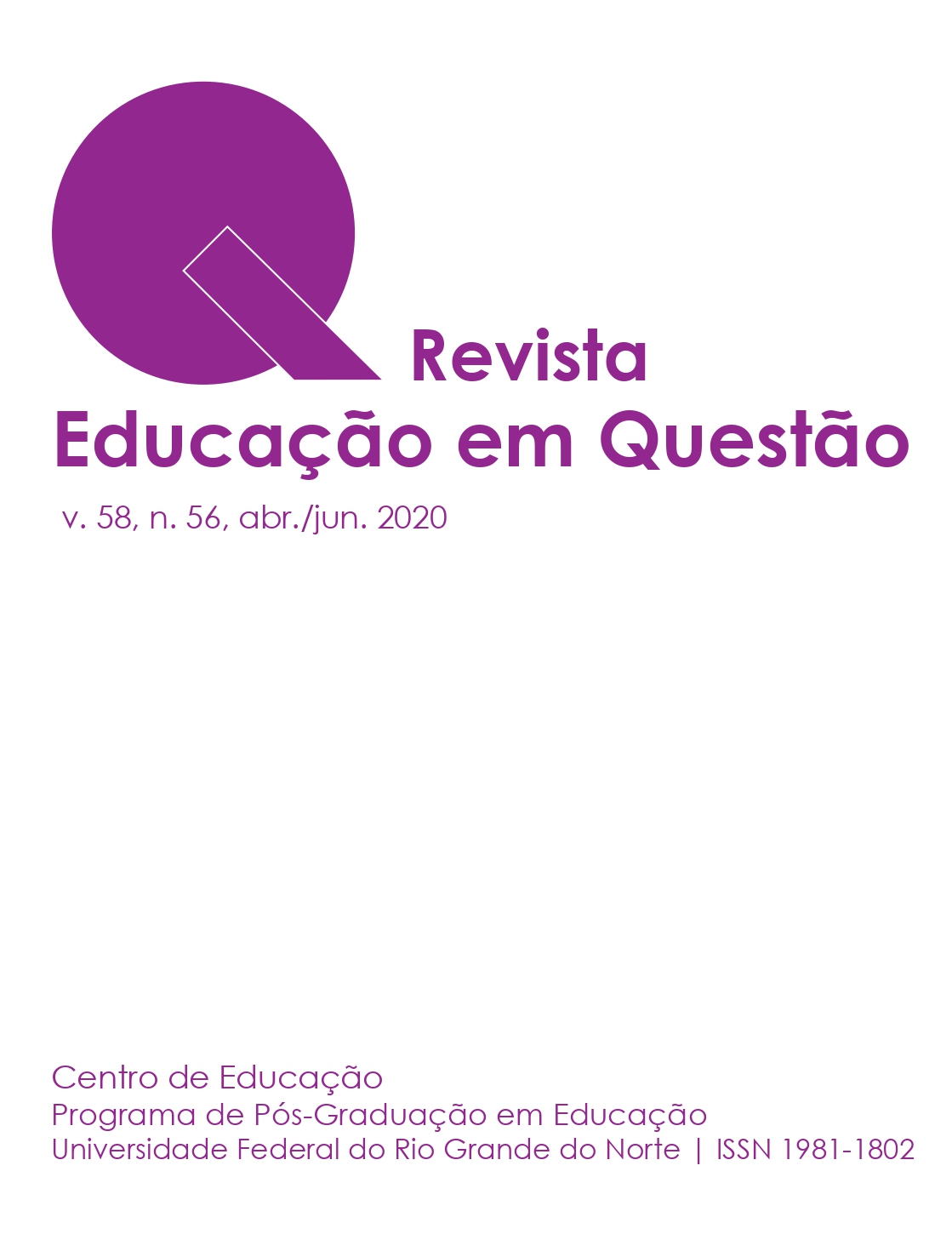Academic writing and plagiarism
DOI:
https://doi.org/10.21680/1981-1802.2020v58n56ID19986Keywords:
Plagiarism. Academic writing. Literacy. High education.Abstract
Plagiarism can be seen as a literacy academic matter. Academic writing is a complex activity involving literacies competencies, such as those needed for consulting, citation, comprehension, and writing from sources. The main goal of the current study was to develop and validate a questionnaire that would measure the perceptions of college students about their literacy competencies. The study included 202 undergraduate students. Exploratory factor analyses were conducted using principal components analysis, having being found: three factors for comprehension strategies scale (selection, organization and integration); three factors for writing strategies scale (planning, revision, and “think-then-do”); three for writing from sources strategiesscale (copy, patchwriting/paraphrase, and summary); two for consulting strategies scale (elementary, elaborated). The citation norms knowledge scale showed a good fidelity. The questionnaire developed will be essential in future research aiming to study the relationship between plagiarism and literacies competencies.
Downloads
References
BEREITER, Carl; SCARDAMALIA, Marlene. The psychology of written composition. Hillsdale, NJ: Lawrence Erlbaum, 1987.
BENNETT, Roger. Factors associated with student plagiarism in a post-1992 university. Assessment and Evaluation in Higher Education, Londres, v. 30, n. 2, p.137-162, Apr. 2005.
BRETAG, Tracey (Org.). The handbook of academic integrity. Singapore: Springer, 2016.
BUCKINGHAM, David. Digital media literacies: rethinking media education in the age of the Internet. Research in Comparative and International Education, Oxford, v. 2, n. 1, p. 43-55, Mar. 2007.
DAVIES, Laura; HOWARD, Rebecca. Plagiarism and the Internet: Fears, facts, and pedagogies. In BRETAG, Tracey (Ed.), The handbook of academic integrity. Singapore: Springer, 2016.
EAST, Julianne. Judging plagiarism: A problem of morality and convention. Higher Education, Londres, v. 59, p. 69–83, May. 2010. DOI: https://doi.org/10.1007/s10734-009-9234-9.
GRAHAM, Steve; EARLY, Jessica; WILCOX, Kristen. Adolescent writing and writing instruction: Introduction to the special issue. Reading and Writing: An Interdisciplinary Journal, Dordrecht, v. 27, n. 6, p. 969–972, Oct. 2014. DOI: https://doi.org/10.1007/s11145-014-9497-0
GULLIFER, Judith; TYSON, Graham. Exploring university students’ perceptions of plagiarism: A focus group study. Studies in Higher Education, [s. l.], v. 35, n.º 4, p.463-481, jun. 2010. DOI: https://doi.org/10.1080/03075070903096508
HAIR, Joseph; ANDERSON, Rolph; TATHAM, Ronald; BLACK, William. Multivariate data analysis. 5th ed. Upper Saddle River: Prentice Hall, 1998.
HAYES, John; FLOWER, Linda. Identifying the organisation of writing processes. In: GREGG, Lee; STEINBERG, Erwin (Eds.). Cognitive processes in writing. Hillsdale, N.J.: Erlbaum, 1980.
HOWARD, Rebecca. A plagiarism pentimento. Journal of Teaching Writing, Indianapolis, v. 11, n. 2, p.233–245, Jan. 1992.
HOWARD, Rebecca. Plagiarism in higher education: An academic literacies issue? Introduction. In: BRETAG, Tracey (Ed.). The handbook of academic integrity . Singapore: Springer. 2016.
HOWARD, Rebecca; ROBILLARD, Amy (Eds.). Pluralizing, plagiarism: Identities, contexts, pedagogies. New York: Heinemann-Boynton/Cook. 2008.
HOWARD, Rebecca; SERVISS, Tricia; RODRIGUE, Tanya. Writing from sources, writing from sentences. Writing & Pedagogy, Lacey, v. 2, n. 2, p. 177-192, May. 2010.
IAVE. Relatório nacional 2016 e 2017. Provas de aferição. Ensino Básico. Lisboa: Instituto de Avaliação Educacional. 2018.
JAMIESON, Sandra (2013). Reading and engaging sources: What students' use of sources reveals about advanced reading skills across the disciplines. Disponível em: http://wac.colostate.edu/atd/reading/jamieson.cfm. Acesso em: 3 mar. 2019.
JAMIESON, Sandra. The evolution of the Citation Project. Developing a pilot study from local to translocal. In: SERVISS, Tricia; JAMIESON, Sandra (Eds.). The evolution of the Citation Project: Lessons learned from a multi-year, multi-study. Utah: State University Press. 2018.
JAMIESON, Sandra; HOWARD, Rebecca. (2011). Unraveling the citation trail. Project information literacy smart talk, n.º 8. Disponível em: http://projectinfolit.org/smart-talks/item/110-sandra-jamieson-rebecca-moore-howard-smart-talk. Acesso em: 4 abr. 2019.
JAMIESON, Sandra; HOWARD, Rebecca. Rethinking the relationship between plagiarism and academic integrity. International Journal of Technologies in Higher Education/Revue Internationale des Technologies en Pédagogie Universitaire, v.16, n. 2, 69. DOI: https://doi.org/10.18162/ritpu-2019-v16n2-07. Online edition published September 5, 2019.
JOINT INFORMATION SYSTEMS COMMITTEE AND THE BRITISH LIBRARY (2012, June 28). Research of tomorrow: The research behaviour of generation Y doctoral students. Disponível em: https://pdfs.semanticscholar.org/6943/75c5ea6d948a59e46d3a614ad57b9e163d86.pdf. Acesso em: 6 maio. 2019.
KELLOGG, Ronald. Writing method and productivity of science and engineering faculty. Research in Higher Education, Dordrecht, v. 25, n. 2, p. 147–163, June. 1986.
KELLOGG, Ronald. Training writing skills: A cognitive developmental perspective. Journal of Writing Research, Antuérpia, v.1, n. 1, p. 1-26, June. 2008.
KINTSCH, Walter. Learning and constructivism. In: TOBIAS, Sigmund; DUFFY, Thomas (Eds.). Constructivist instruction: Success or failure? New York: Routledge. 2009. p. 223-241.
ODENA, Oscar; BURGESS, Hilary. How doctoral students and graduates describe facilitating experiences and strategies for their thesis writing learning process: A qualitative approach. Studies in Higher Education, [s. l.], v. 42, n. 3, p. 572-590, July. 2017. DOI: https://doi.org/10.1080/03075079.2015.1063598
PECORARI, Diane. Academic writing and plagiarism. A linguist analysis. London: Continuum International Publishing Group. 2008.
PECORARI, Diane. Plagiarism, international students, and the second-language writer. In: BRETAG, Tracey (Ed.). The handbook of academic integrity. Singapore: Springer. 2016. p. 537-550.
ROUET, Jean-François. The skills of document use. From text comprehension to Web-based learning. New York: Routledge. 2006.
TORRANCE, Mark; THOMAS, Glyn; Robinson, Elizabeth. Individual diferences in undergraduate essay-writing strategies: A longitudinal study. Higher Education, Londres, v. 39, n. 4, p. 181-200, June. 2000.
VAN DIJK, Teun; KINTSCH, Walter. Strategies of discourse comprehension. New York: Academic Press. 1983.
WEBER-WULFF, Debora. False feathers: A perspective on academic plagiarism. Berlin: Springer. 2014.
YOSHIMURA, Fumiko. Japanese University students’ task representations of paraphrasing and their experience with it. Tohoku Gakuin University Review: Essays and Studies in English Language and Literature, Sendai, v. 99, p. 1-21, Mar. 2015.
Downloads
Published
How to Cite
Issue
Section
License
The Journal Education in Question shall retain the copyright in all articles that it publishes.
The authors and co-authors of articles and book reviews, published in the Journal Education in Question, shall wait for at least 1 (one) year before they are allowed to submit new works for publication.






